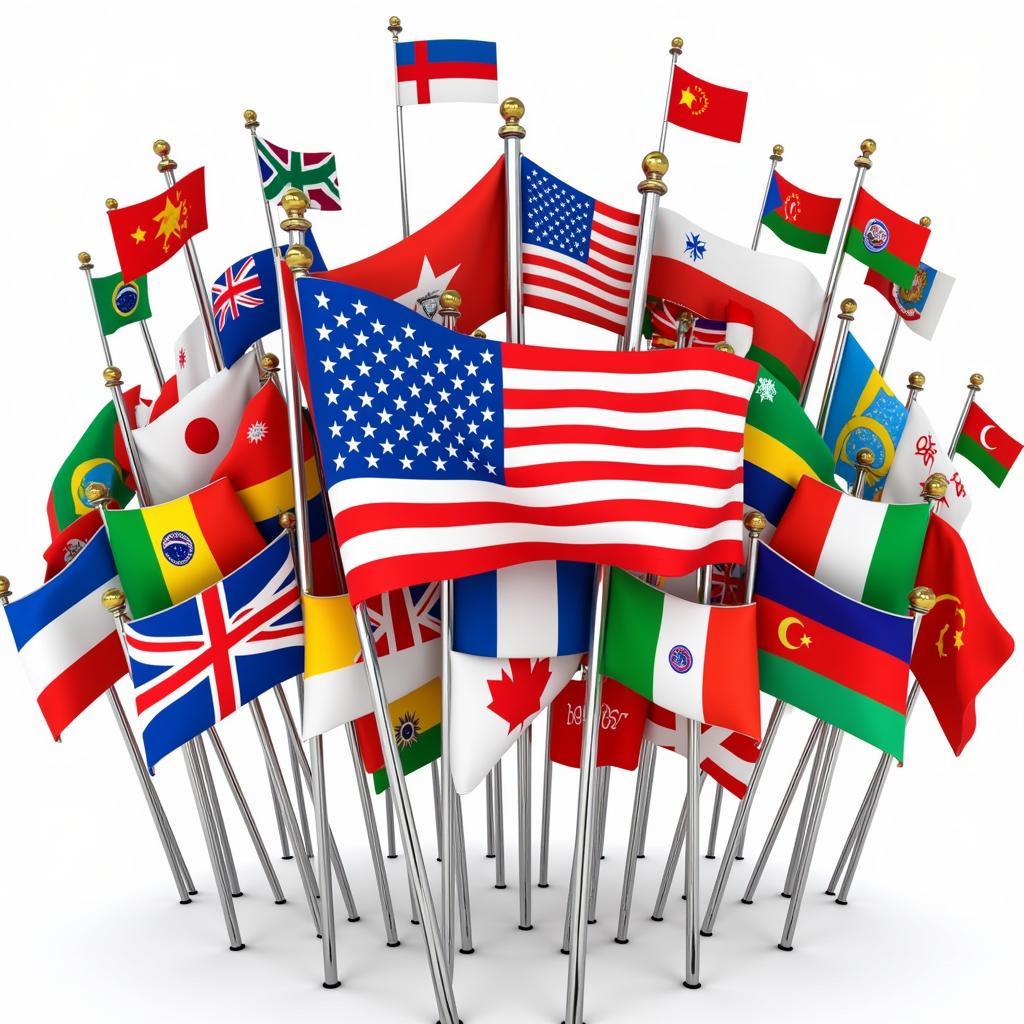Nationalism and patriotism are often used interchangeably, but a closer look reveals key distinctions. Understanding the nationalism vs. patriotism difference is crucial for navigating political and social discourse. These two concepts, while seemingly similar, represent fundamentally different approaches to one’s relationship with their country.
Defining Nationalism and Patriotism
Patriotism is generally defined as love and devotion to one’s country. It’s a feeling of pride and loyalty, a sense of belonging and shared identity. Patriots appreciate their nation’s history, culture, and values, and they strive to contribute to its betterment. Nationalism, on the other hand, often involves a belief in the superiority of one’s nation over others. It can manifest as an aggressive promotion of national interests, sometimes at the expense of international cooperation.
 Nationalism vs. Patriotism: Flags of Different Countries
Nationalism vs. Patriotism: Flags of Different Countries
Key Differences: A Comparative Analysis
While both concepts relate to national identity, they differ significantly in their expression and implications. Patriotism is often characterized by:
- Respect for one’s country and its symbols: This includes the flag, anthem, and national traditions.
- A desire to contribute to the common good: Patriots seek to improve their nation through civic engagement and responsible citizenship.
- Tolerance and respect for other nations: Patriotism doesn’t necessitate a belief in national superiority.
Nationalism, conversely, often entails:
- A belief in national superiority: Nationalists often view their nation as inherently better than others.
- A focus on national interests above all else: This can lead to isolationism and hostility towards other countries.
- Intolerance and xenophobia: Nationalism can fuel prejudice and discrimination against people from other nations.
Nationalism vs. Patriotism: A Spectrum of Beliefs
It’s important to recognize that nationalism and patriotism exist on a spectrum. Healthy patriotism can foster national unity and progress. However, unchecked nationalism can lead to conflict and division.
The Impact on Global Relations
The distinction between nationalism and patriotism has profound implications for international relations. Patriotism, with its emphasis on cooperation and mutual respect, can contribute to a more peaceful and interconnected world. Nationalism, on the other hand, can create barriers between nations, fueling conflict and hindering collaboration.
Nationalism vs. Patriotism in the 21st Century
In an increasingly globalized world, understanding the nuances of nationalism and patriotism is more crucial than ever. These concepts continue to shape political discourse, influence social movements, and impact international relations.
Navigating the Complexities
Recognizing the difference between nationalism and patriotism allows us to engage in more informed and productive discussions about national identity and global citizenship. It encourages us to embrace the positive aspects of patriotism while remaining vigilant against the dangers of unchecked nationalism.
Conclusion
The nationalism vs. patriotism difference is a crucial distinction in understanding one’s relationship with their country. While patriotism emphasizes love and loyalty, nationalism often involves a belief in national superiority. Recognizing this difference is essential for fostering healthy national pride while mitigating the risks of exclusionary nationalism. By understanding these concepts, we can contribute to a more inclusive and interconnected world.
FAQ
- Is patriotism always a positive thing? While healthy patriotism can be beneficial, blind patriotism can lead to overlooking a nation’s flaws.
- Can someone be both patriotic and nationalistic? Yes, it’s possible to hold both patriotic and nationalistic sentiments simultaneously.
- How can we promote healthy patriotism? Educating citizens about their nation’s history, values, and responsibilities can foster healthy patriotism.
- What are the dangers of extreme nationalism? Extreme nationalism can lead to xenophobia, discrimination, and international conflict.
- How does globalization impact nationalism and patriotism? Globalization can challenge traditional notions of national identity, leading to both increased nationalism and a growing sense of global citizenship.
- What role does education play in shaping national identity? Education plays a crucial role in shaping national identity by imparting knowledge about a nation’s history, culture, and values.
- How can we foster understanding and tolerance between nations? Promoting intercultural dialogue and exchange programs can foster understanding and tolerance between nations.
Mô tả các tình huống thường gặp câu hỏi
Người dùng thường đặt câu hỏi về sự khác biệt giữa chủ nghĩa dân tộc và lòng yêu nước trong các bối cảnh như: thảo luận chính trị, các sự kiện thể thao quốc tế, và các cuộc tranh luận về nhập cư. Họ muốn hiểu rõ hơn về các sắc thái của hai khái niệm này và cách chúng ảnh hưởng đến hành vi cá nhân và các mối quan hệ quốc tế.
Gợi ý các câu hỏi khác, bài viết khác có trong web.
- Sự khác biệt giữa chủ nghĩa dân tộc và chủ nghĩa toàn cầu là gì?
- Làm thế nào để cân bằng lòng yêu nước với sự tôn trọng các nền văn hóa khác?
- Chủ nghĩa dân tộc có phải luôn là một điều tiêu cực?